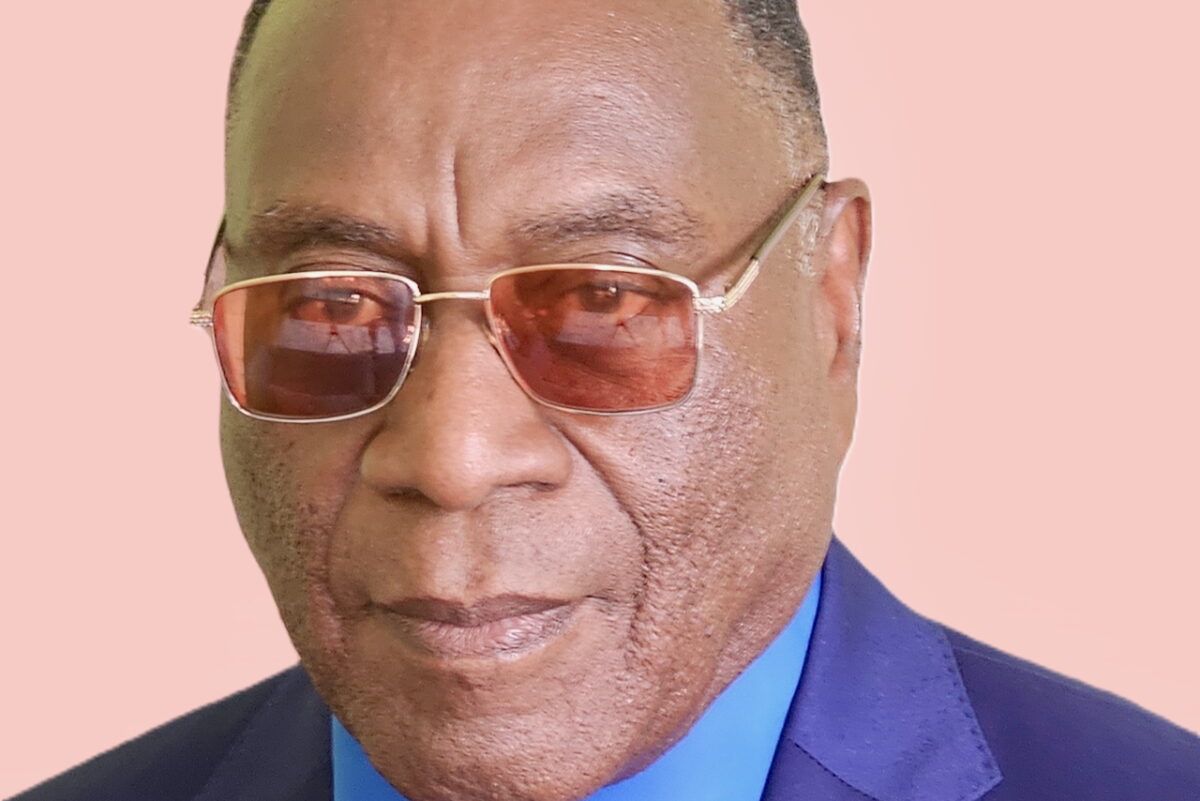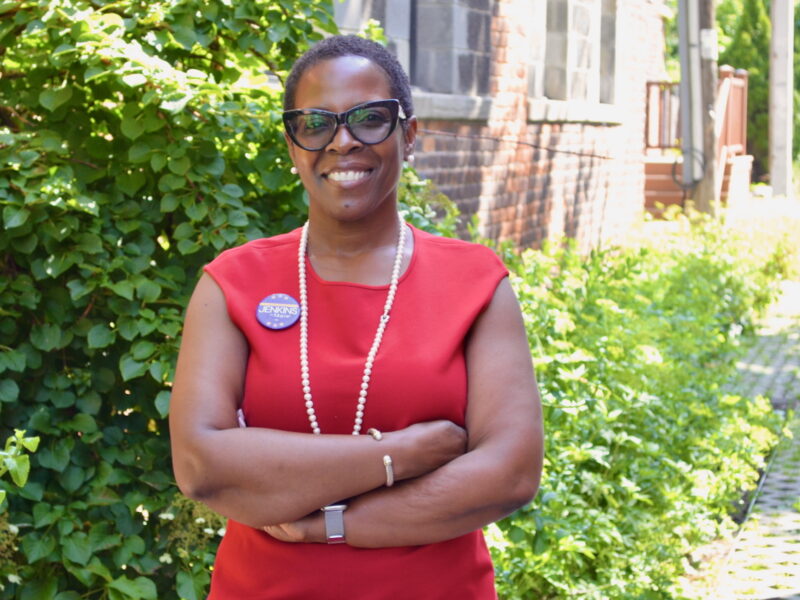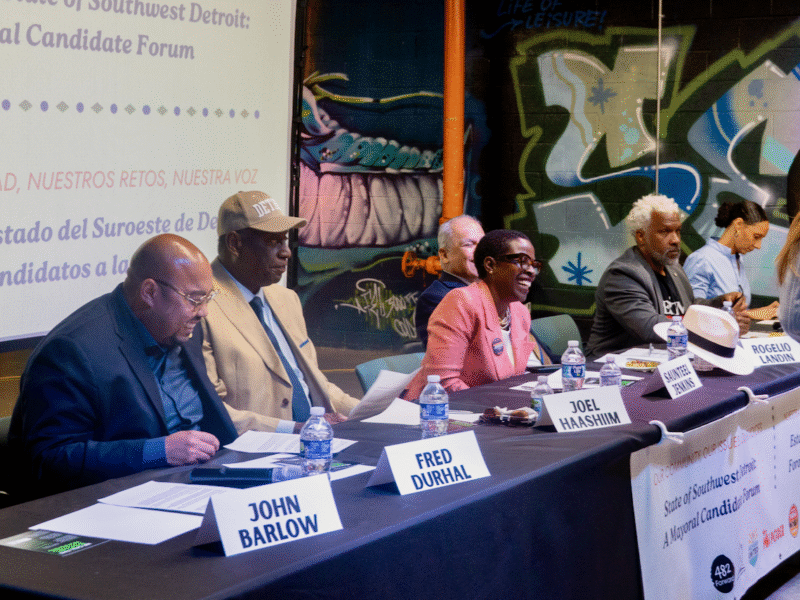Overview:
-Mayoral candidate Joel Haashiim says he supports budgeting city funds for utility bill assistance.
-His focus is on bringing additional revenue to the city as federal dollars dwindle, he tells Planet Detroit.
-The building of solar farms on usable land in the city “is not a wise decision,” Haashiim says.
Businessman Joel Haashiim opened his first store, Brothers Party Store, when he was 20, and opened two more stores before selling them and working in wholesale and distribution.
Haashiim’s mother was a Pentecostal minister and member of Greater Grace Church, and his father was a foreman at Chrysler. Growing up in a family of seven, Haashiim studied at the Black-owned Vaughn’s Book Store and joined the Nation of Islam at the age of 12 and participated in many other Black-centered groups and organizations, according to his biography.
He’s on the ballot Tuesday, Aug. 5 in the Detroit mayoral race, and spoke with Planet Detroit about environmental and public health issues in the city. This interview has been edited for brevity and clarity.
How would you balance economic development with environmental impact, for example with a project like the Stellantis plant opened under Mayor Duggan, which created new air pollution issues for east side residents?
The Stellantis plant is a “big issue on the east side,” Haashiim told Planet Detroit, adding that he is in favor of regulating — “full measure” — polluters.
“We have a lot of people suffering in the city as a result of these factories polluting.”
Haashiim is interested in bringing cleaner industries to Detroit, giving the example of computer chip manufacturing, and a diverse balance of industry in the city, he said.
Are there any steps you would take to work with Michigan’s Department of Environment, Great Lakes, and Energy to hold polluters accountable?
“A mayor’s job is to protect the people, and so he has to be very vocal to the state, to the the federal government, to make sure they are enforcing the law as it relates to pollution,” Haashiim said.
If elected mayor, he said he would look at using the city’s law department to investigate the city’s powers and rights to stop pollution.
Do you have a stance on the air quality in Detroit and the issue of cumulative impact?
Haashiim owned an environmental company, Green Energy, and traveled with a Wayne County trade delegation to China to study environmental issues, he said.
Detroit needs increased environmental enforcement, he said.
“Detroit has a lot of our young people who are sick. We have a high incidence of asthma and other lung related issues amongst the children, and it, of course, is affecting our seniors in those areas,” he said. “So we need a strong mayor that’s going to protect the people.”
What is your stance on urban agriculture and composting? Would you support a new, standalone composting ordinance?
Haashiim is in favor of urban farming to combat rising food prices, homelessness, and families that are suffering, he said. He would study composting “to make sure we don’t oversaturate anything, and that everything continues to be safe,” he said.
“It’s clear that every local municipality is going to have to stand on its own foundation.”
What would your approach be to Detroit’s Office of Sustainability and its funding?
“If you don’t have sustainability, everything else starts falling apart,” Haashiim said.
His campaign is focused on bringing in revenue for the city, he said, “so that we can actually make sure that the sustainability department is strong and that we have the money and resources needed for the city’s future.”
How can the mayor address the issue of utility affordability with DTE Energy and the Detroit Water & Sewerage Department?
Haashiim favors municipal utilities, he said, adding that the Detroit River could be used for hydro power.
“Whenever someone has a monopoly, we always see an infringement. We always see the lack of ability to control the pricing. And so it is really hurting those impoverished people in our community, and it’s hurting our seniors on fixed income. It’s all the way around hurting us,” he said of utility costs.
The mayoral candidate said he would communicate with DTE and others about streamlining or reducing costs.
Would you support budgeting city funds for shutoff assistance for water and electricity?
“Yes. You know, we can’t have people in the heart of the winter, especially families, sitting up in the cold, possibly losing their lives or having other, you know, health issues because of sitting in cold weather,” Haashiim said.
Detroit’s $3 billion budget needs to “grow,” Haashiim said. He criticized the Great Lakes Water Authority: “they took a $1 billion asset from Detroit.” The “taking of Detroit’s city assets during the bankruptcy” was a negative development, he said.
“Detroit needs to take its water back,” he said.
How would you address Detroit’s growing flooding problem?
Haashiim would work with the federal government to allocate resources to solve Detroit’s flooding problem, he said.
“The current tone is that you may have a little difficulty — maybe you’ll go and get some of what you need, but not all of what you need. It definitely will not be like it was before. And so I would definitely go to the federal and to the state for the money and resources that we can get,” Haashiim said.
He reiterated that he would be “highly focused” on bringing additional revenue to the city.
Speaking about the example of the flood-prone Jefferson Chalmers neighborhood, Haashiim said he would seek more help from the Great Lakes Water Authority.
“They have not really addressed these issues,” he said of GLWA. “They’re very slow in developing the resources and the (repairs).”
What is your stance on ICE enforcement in Detroit and the city’s friendliness to immigrants?
The Detroit Police Department has enough issues to solve, Haashiim said, adding that immigration is “a federal issue.”
He does not envision using city resources to work with ICE, he said. When asked for his opinion on the Trump administration’s immigration tactics, Haashiim said: “I think it could be a little more humane,” and said people in Black America know what it is like to be victimized and mistreated.
“I do think some of it is borderline or over the edge, but at the same time, you know, we are not able to do very much as it relates to giving resources to illegal immigrants. We have so many Detroit residents that are in need of finance and so many services that they need,” Haashiim said.
“I just want to be clear that I’m not against people coming to this country to have a better life, but I don’t want to necessarily use Detroit resources.”
MORE PLANET DETROIT REPORTING
Detroit mayoral candidate Saunteel Jenkins says she’ll work for city’s most vulnerable
Detroit mayoral candidate Saunteel Jenkins talks environmental impact, utility affordability, public transit, public health, ICE, the Office of Sustainability, and the tree canopy with Planet Detroit.
Heat waves challenge Detroit renters: Should city legislate air conditioning?
A Detroit apartment building’s air conditioning failure raises questions about what the city can do to protect renters from heat as the climate warms.
Southwest Detroit mayoral forum highlights public health, immigration
Southwest Detroit residents raise ongoing issues from February’s water main break and health impacts from truck traffic. Candidates promise action to help an area they say has been neglected.
Do you have any position on the new Detroit rental ordinance and specifically on lead inspections?
Too many Detroit homes are being rented or sold with high levels of lead, mold, mildew, and fungus, Haashiim said.
“We need strong enforcement in that area, because you’re impacting people’s health negatively,” he said, adding that as mayor, he would “clamp down” on landlords to ensure they have certificates of occupancy and the law is being followed.
Haashiim would expand the building department, he said.
What is your position on solar developments in Detroit neighborhoods?
The building of solar farms on usable land in the city “is not a wise decision,” Haashiim said. “I think we can use solar in other places,” he said, giving the examples of solar panel placement along the freeways and on buildings.
“We can do a lot of things to address the issue of bringing in solar energy without taking up usable land that we really need to repopulate the city and to bring in other types of industry that will create jobs for the residents in the city of Detroit.”
How can the mayor improve Detroit’s public transit?
Haashiim supports a rail system that connects Ann Arbor, the airport, and downtown Detroit, and said a regional transit system is needed, giving the examples of a rail system that connects Ann Arbor, Detroit Metropolitan Airport, and downtown Detroit, as well as the extension of the QLINE to 8 Mile Road.
He called for a redesign of Detroit’s streets, with more one-way streets “to improve and increase traffic flow and safety.”
Detroit Department of Transportation drivers need higher pay, and the system needs to run efficiently, he said.
“We need efficiency with our transit system as well as quality, and you’re not going to get that until you get a mayor that’s progressive and innovative in his thinking.”





